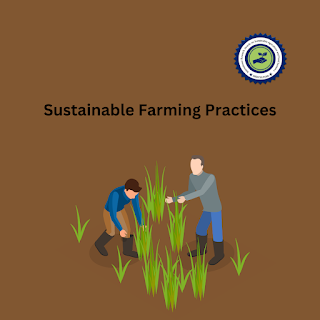Sustainable Farming Practices
Sustainable farming practices have been gaining significant traction in recent years as concerns about environmental degradation, climate change, and food security continue to grow. Here are some key aspects and trends within sustainable agriculture:
Organic Farming: The demand for organic produce has been steadily increasing as consumers become more conscious of the health and environmental impacts of conventional agriculture. Organic farming avoids synthetic fertilizers, pesticides, and genetically modified organisms (GMOs), focusing instead on natural methods of pest control and soil fertility management.
Regenerative Agriculture: This approach goes beyond sustainability by aiming to restore and enhance ecosystems. Regenerative practices include minimal tillage, cover cropping, crop rotation, and holistic grazing to improve soil health, increase biodiversity, and sequester carbon from the atmosphere.
Agroecology: Drawing on principles from ecology and traditional farming practices, agroecology seeks to create resilient agricultural systems that work in harmony with nature. It emphasizes biodiversity, nutrient cycling, and the use of locally adapted crops and livestock breeds to promote long-term sustainability and resilience to climate change.
Permaculture: Permaculture design principles focus on creating self-sustaining agricultural systems that mimic natural ecosystems. By integrating elements such as perennial crops, agroforestry, and water harvesting techniques, permaculture aims to maximize productivity while minimizing inputs and ecological footprint.
Soil Health Management: Healthy soils are essential for sustainable agriculture, as they support plant growth, water retention, and nutrient cycling. Practices such as cover cropping, composting, mulching, and no-till farming help to improve soil structure, fertility, and resilience to erosion and drought.
Water Conservation: Sustainable farming involves efficient water management to reduce consumption and minimize negative impacts on freshwater resources. Techniques such as drip irrigation, rainwater harvesting, and soil moisture monitoring help farmers optimize water use and mitigate the effects of drought.
Crop Diversity and Resilience: Monoculture farming is being increasingly recognized for its vulnerability to pests, diseases, and climate fluctuations. Sustainable agriculture promotes crop diversity through mixed cropping, intercropping, and the preservation of heirloom varieties, which enhances resilience and reduces the risk of crop failure.
- #SustainableFarming
- #RegenerativeAg
- #Agroecology
- #OrganicFarming
- #Permaculture



0 Comments:
Post a Comment
Subscribe to Post Comments [Atom]
<< Home